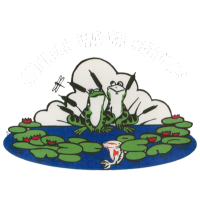Frequently Asked Questions
Q.: Will predators eat all my fish?
A.: Most fish will swim to a deeper part of the pond when threatened by a predator. Giving your fish places to hide helps to keep them stress-free. This can be accomplished by creative placement of rocks in and around the pond, plenty of lily pads or other aquatic vegetation to help provide added protection for your fish.
Q.: Will rocks and gravel make it difficult to clean my pond?
A.: Rocks and gravel are very beneficial to your pond’s eco-system by allowing aerobic bacteria to colonize. Bacteria breaks down fish waste and debris that collects at the pool bottom, giving the overall pool a healthier environment for fish. This natural action makes cleaning the pool a much simpler task.
Q.: What’s the best way to keep my pond water clean?
A.: The best way to maintain clear pond water is to let Mother Nature create a natural balance in the pond. Just as explained above, a natural life cycle includes waste and plant debris collecting on the pond bottom, then broken down by beneficial bacteria colonies. The bio-degradation is then taken back up as plant food and the cycle continues. Check with Natural Water Gardens staff to see if an occasional algaecide should be added.
Q.: Will my pond invite mosquitoes?
A.: Mosquitoes normally will lay their eggs in still, stagnant water. Should any mosquitoes happen to hatch larvae in your pond, the fish will have a real treat picking them off the water. Your skimmer will catch the rest.
Q.: My pond has lots of trees nearby. Won’t the leaves damage the pond?
A.: During fall months you will have more leaves in the pond. However, in the summer the trees provide welcome shade that reduces algae bloom. Your skimmer will pull most of the leaves into a waiting net and can be a daily task to empty for just a few weeks in the fall.
Q.: Is it OK to use chemicals in a pond with fish?
A.: Occasional use of algaecide (copper sulfate) or dechlorinator (sodium thiosulfate) and fish antibiotics in proper dosages are commonly used as “quick-fix” solutions to balance related problems. However, the best solution is always to attack the root cause, making sure the pond is naturally balanced and maintained.
Q.: How will a pond affect my home value?
A.: A water garden is quite different than having a swimming pool in determining home value for resale. With the growing demand for well-designed residential water features, most real estate agents agree that home value normally increases by the addition of attractive waterscapes. Swimming pools normally have the opposite home value effect.
Q.: Should my pond be at least three feet deep to properly keep koi?
A.: Natural Water Gardens has installed thousands of ponds – most are less than 3 feet deep and full of happy, healthy koi and Shubunkin goldfish. Even here in the upper Midwest, water only freezes about 8 inches below the surface in the coldest winter months. Pond fish have no problem hibernating in these conditions.
Q.: Will having plants in my pond adversely affect koi?
A.: Quite the contrary. Pond fish love to eat plants, and surprisingly, they’ll live nicely without you feeding them at all due to the presence of plants and algae in the pond. The key to success is maintaining a good proportional balance of plants available for the koi to feed upon.
Q.: Is it better to bring fish inside during winter months?
A.: Actually, your fish will do better in their natural environment during winter months. Maintaining 2 feet of water with oxygenation, and a hole in the ice with a bubbler allows naturally produced gases to escape. Your fish will hibernate during the cold months and then slowly awaken as the weather warms up in the spring.
Q.: Do I have to test the pond water daily?
A.: Indoor aquariums perhaps – ponds no. A naturally balanced pond or water garden very seldom needs testing.
